For a game which markets itself as a balm, as a soothing antidote to the pressures of modern life and as the perfect game for casual players, I find that I play Animal Crossing: New Horizons with a kind of frenzied, fractured intensity, logging on for seven hours a day for two weeks or not at all for six months.
It’s always been like this, even since I played Wild World at the age of nine—there wasn’t as much gameplay in that earlier iteration, but somehow I found a way to maximise all content, all the time, in a way which is clearly completely antithetical to its spirit. There’s more things to do in New Horizons than in any Animal Crossing game that preceded it, and so it makes sense that I play it even harder, better, faster, stronger, with an odd, laser-focused rabidity. It’s strange that that is the case, though, considering how the majority of gameplay mechanics are things I find irritating in other games—there’s a focus on in-game collectibles, the gameplay is grindy, and the dialogue with your villagers is repetitive. And yet, along with millions of others at the beginning of the pandemic, I found that I was playing it to the point where I could close my eyes at night and see custom paths bloom.
It comes down to terraforming—the building mechanic which lets you build and collapse cliffs, create ponds and waterfalls. It should be relaxing, but for me it becomes weirdly stressful instead. It could go on forever, but I’m not quite sure why you’d want it to. I terraform and decorate obsessively, then begin to feel deflated by it, struggle along for a few more days or weeks with all the enthusiasm of a marathon runner whose legs have fallen off, and then eventually admit defeat and burn out.
I didn’t play the game at all over the summer, deflated by how gross my island looked in comparison to the reams of #cottagecore content that kept getting recommended to me on Pinterest. I felt guilty about abandoning my town and my villagers in a way that I don’t feel guilty about abandoning huge open world games.
And yet, in October, almost despite myself, I was drawn back to it.
The days were getting shorter, the light outside less golden, and my interest in Animal Crossing began to wax again after its slow summer wane, in tandem with an uptick in UK Covid-19 cases after a relatively calm summer. So I squirrelled myself away and played it for two weeks straight, every single day, for upwards of two hours a day. It became like tunnel vision. My sister would come into my room to find me hunched over my Switch, hair unwashed, eyes bloodshot, muttering about tile space. I cleared the island of weeds, water-
scaped an enormous lake, planted trees, moved villager houses, set down new paths, searched for new custom patterns on tumblr, hunted down new crafting recipes like a pig sniffing out truffles.
But I was only mildly pleased with my progress. I thought the island looked fine. Nice, maybe. Not good, though. Not great. Not like the screenshots I saw on Pinterest. Not good enough at all, really. What was the point, then? At the end of the day, really, what was the point of putting 200 hours into this game?
The Animal Crossing icon on my Switch homepage now blinks balefully at me as I click on to play Hades. Watching me. But I don’t give in. Maybe that’s for the best.
Ava Wong Davies (twitter) is a writer from London. As a theatre critic, she writes for Exeunt Magazine, The Independent, The Stage, and gal-dem, and in 2018 won the Harold Hobson Sunday Times award for theatre criticism. As a playwright, she has been under commission to Audible, Oxford Playhouse, and 45North. She is represented by Independent Talent.
Image: Animal Crossing press image.
